Recent Comments
- Chodpa on The Place where the Primordial Speaks
- Chodpa on The Cuckoo of Presence
- Afzar on Bodhidharma’s teacher, Prajnatara
- Vajragoni on Audiobook is released
- Scott on Audiobook is released
-
Recent Posts
Categories
- A Darkness Visible
- A Docetic Assessment
- A Mystical Odyssey through the Sagathakam
- AI Creations
- Akṣayamatinirdeśasūtra
- Akṣhobhya’s Pure Land
- Ālaya-vijñāna
- Anūnatvāpūrṇatvanirdeśaparivarta
- Ariyapariyesanā Sutta
- Ascending the Noble Mountain of Primordial Perfection
- Asceticism
- Ashtavakra Gita in Light of the Unborn
- Audiobook
- Bankei Zen
- Beyond the Ascent
- Beyond the Rainbow Body
- Black Dragon Eye Mandala
- Bodhicitta
- Buddhadharma
- Buddhism’s Black Holes
- Buddhist Anecdotes
- Buddhist Hells
- Buddhist Meditations on the Tarot
- Chuang-Tzu
- Contemporary Musings
- Ḍākiṇī
- Dāsbodh
- Dharmakaya Abbey
- Dharmakaya Stick
- Divine Revelation
- Doctrine of the Void
- Dust Contemplation
- Ekacitta: Advanced Studies in Dark Zen
- Entry into the Dharmadhātu
- Eremitical Dhyani Meditations
- Exploring the Book of Revelation
- Gnostikos
- Hsin Hsin Ming
- Journey to the Center of the Mind
- Karma and Rebirth
- Korean Sŏn
- Kulayarāja Tantra—The Motherly Buddha
- Little Office of Our Lady of the Void
- LSD and Psychedelic Buddhism
- Māṇḍukya Kārikā
- Mañjuśrī Teaches Prajñāpāramitā
- Māra and Satan
- Meister Eckhart
- Mud and Water: Bassui Zen
- Mystagogia
- Nirvana
- Notes from the Iron Stupa
- Nothingness in Nāgārjuna and John of the Cross
- Obscure Religious Cults
- Preparation for the Afterlife
- Primordial Qigong
- Reflections on the Saṃdhinirmocana Sūtra
- Spirituality
- Springtime with Tozen
- Terma: A Mind Film by Vajragoni
- The Afterglow
- The Awakening of Faith
- The Bhagavad Gita
- The Book of Bodhi
- The Cloud of Unknowing in Light of the Unborn
- The Diamond Sutra
- The Divine Ātman
- The Divine Liturgy of Vajrasattva
- The Doctrine of Awakening
- The Dragon Mind of Zen Tarot
- The Elucidation of Consciousness
- The Experience of No-Self
- The Great Perfection of the Unborn Mind: A Book of Privy Counseling
- The Heart Sutra
- The Hermit's Den
- The Khaggavisāṇa Sutta: A Rhinoceros Horn
- The Lankavatara Sutra
- The Lankavatarian Book of the Dead
- The Lion's Roar of Queen Śrīmālā
- The Lotus Sutra
- The Mahāparinirvāṇasūtra
- The Naga Chronicles
- The Platform Sutra
- The Ratnagotravibhāgaśāstra
- The School of the Spirit
- The Secret Golden Light of the Unborn
- The Soul
- The Śūrańgama Sūtra
- The Sutra of Primordial Enlightenment
- The Tathāgatagarbhatārā Tantra
- The Udāna
- The Unborn Mind Mythos
- The Unborn Mind Sessions
- The Unborn Odyssey: A Novel
- The Vajrasamādhi Sutra
- The Vimalakirti Sutra
- The Yogasūtras of Patañjali
- The Zen Teaching of Bodhidharma
- The Zen Teaching of Instantaneous Awakening
- The Zen Teachings of Huang Po
- Theologia Mystica
- Tozen Teaching
- Tsung-mi: An Intimate Study
- Unborn I Ching
- Unborn Light Reiki
- Uncategorized
- Vasubandhu and the Absolute
- Wisdom from the Masters
- Wordsworth and Zen
- Yoga of the Manomayakāya
- Zen
- Zuowang
Archives
- October 2024
- August 2024
- February 2024
- January 2024
- December 2023
- November 2023
- October 2023
- September 2023
- August 2023
- July 2023
- June 2023
- May 2023
- April 2023
- March 2023
- February 2023
- January 2023
- December 2022
- November 2022
- October 2022
- September 2022
- August 2022
- May 2022
- April 2022
- March 2022
- February 2022
- January 2022
- December 2021
- November 2021
- October 2021
- September 2021
- August 2021
- May 2021
- April 2021
- March 2021
- February 2021
- January 2021
- December 2020
- November 2020
- October 2020
- September 2020
- August 2020
- May 2020
- April 2020
- March 2020
- February 2020
- January 2020
- December 2019
- November 2019
- October 2019
- September 2019
- August 2019
- June 2019
- February 2019
- January 2019
- December 2018
- October 2018
- August 2018
- April 2018
- March 2018
- February 2018
- January 2018
- December 2017
- November 2017
- October 2017
- September 2017
- August 2017
- May 2017
- April 2017
- March 2017
- February 2017
- January 2017
- December 2016
- November 2016
- October 2016
- September 2016
- August 2016
- July 2016
- May 2016
- April 2016
- March 2016
- February 2016
- January 2016
- December 2015
- November 2015
- October 2015
- September 2015
- August 2015
- July 2015
- June 2015
- May 2015
- April 2015
- March 2015
- February 2015
- January 2015
- December 2014
- November 2014
- October 2014
- September 2014
- August 2014
- May 2014
- April 2014
- March 2014
- February 2014
- January 2014
- December 2013
- November 2013
- October 2013
- September 2013
- August 2013
- May 2013
- April 2013
- March 2013
- February 2013
- January 2013
- December 2012
- November 2012
- October 2012
- September 2012
- August 2012
- May 2012
- April 2012
- March 2012
- February 2012
- January 2012
- December 2011
- November 2011
- October 2011
Meta
Monthly Archives: February 2022
North American Indian Soulology

Of all our blog-segments for this series the present one is perhaps the most intriguing. For such a primitive culture the North American Indians notion of soul is far from simplicity—indeed, it is rooted in various soul-extensions or soul-pluralisms. Essentially, each tribe has its own soul-system. Different tribes have different notions of soul–hence, no uniformity amidst the tribes. Yet, one renowned scholar in the field, E.B. Tylor, developed and vividly pointed to the understanding of the general perception of this phenomenon by American Indians: “soul is a fine, immaterial human image, something like steam, air or shadow by its nature. It is the cause of life and thought in the creature it animates”. While multilayered, there are two dominant strains in this analysis: soul is formed from a root-verb, sken.
Christian Mystics & the Soul
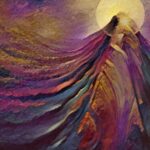
The first on the horizon to give birth to what became known as Christian Mysticism is undoubtedly Dionysius the Areopagite. He in essence formulated the terminology that Christian Mystics use to describe their experience of Union with the Godhead. Yea, despite the overwhelming influence of Dionysian ideas on writers such as Eriugena, Meister Eckhart, The Cloud of Unknowing and many others, there has never been anything like Dionysian theology—it set the apophatic standard for all that came after it. Dionysius shed illuminative light on the notion of the soul:
The great delusion and awakening of the soul

The great sadness of deity-based religions, be it monotheistic or polytheistic ones, the deity in name and worship, be it One or Many, all suffer from the souls’ delusion of servitude, either desired or forced upon itself by merit of self-ignorance, fear, love or guilt. It is servitude to something higher than its actual true self – the latter being PURE SPIRIT, BUDDHA NATURE, but in the soul by reason of ignorance being perceived as lower. It fails to realize that in any realm, or reality, there is nothing higher than its true self.
Aerial Toll Houses
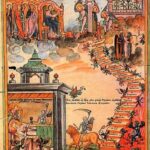
The phenomenon of what has become known as the Aerial Toll Houses is Eastern Orthodox in origin. It was made popular again due to the efforts of Fr. Seraphim Rose (1934-1982) in his book, The Soul After Death. But it’s an olden belief. Etymologically these “toll houses” are also named “telonia”, from the Greek:τελωνεία / telonia, customs). Not all Eastern Orthodox Ecclesiastical offices are sold on the idea, but the immense literature on the subject by renowned Orthodox saints, theologians, and ascetical personages place it in the category of being a spiritual probability. An immense Volume, The Departure of the Soul, According to the Teaching—A Patristic Anthology (2016), numbering 1111 pages is indeed a vast anthology of the said personages who give absolute witness and credence to the phenomena. According to the literature, once the soul leaves the body it enters an aerial realm that is populated by a denizen of evil spirits that block the passage to Heaven in toll-houses where the demons proceed to accuse the soul of past sins with the intent of dragging it down in the fiery depths of hell.
St. Maximus the Confessor: Premier Ascetical Theologian of the Byzantine Orthodox Tradition

We now turn East in our series and consider the most brilliant Byzantine-Orthodox Ascetical Theologian of them all, St. Maximus (Maximos) the Confessor (580-662). He lived through the most catastrophic period the Byzantine Empire was to experience before the Crusades. He was highly educated and served as the executive chief-secretary of Emperor Heraclius but eventually abandoned this walk of life and became a monk. He wrote voluminous ascetical and theological works. He became a staunch critic of the Monothelite heresy:
St. Augustine—The Great Lover of the Soul and Spirit
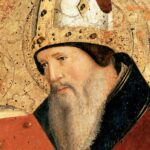
St. Augustine, also known as Saint Augustine the Bishop of Hippo (Aurelius Augustinus, 354-430 CE), caroused in promiscuity at the age of 18 while a student at Carthage. Sex was an overriding obsession. He would later write in his Confessions, “From a perverted act of will, desire had grown, and when desire is given satisfaction, habit is forged; and when habit passes unresisted, a compulsive urge sets in.” Hence, his early life can be likened unto the Prodigal Son, who this time in the person and prayers of his mother, Monica, was inspired to end his carousing ways. He was later officially converted through the sermons of Bishop Ambrose, who was also later to be crowned a Saint. Augustine and his teacher Ambrose are the first Latin Christian writers to maintain that the human soul is incorporeal.
Posted in The Soul
Tagged Ambrose, contemplation, Manichaeism, Monica, St. Augustine
Leave a comment
Plotinus—The Man of the One and Unborn
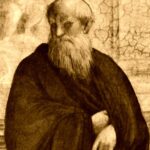
All Platonic notions reached their Zenith in the teachings of Plotinus (205-270 AD). Philosophy for men like Plotinus was a full-time professional occupation and religious vocation that demanded withdrawal from worldly affairs. He disregarded physical hardships, right up to the point of his death by a form of Leprosy-ailment:
Posted in The Soul
Tagged Function of the Soul, Plotinus, The One, Transcendent Father
Leave a comment
Recognize the difference between Spirit and Soul.
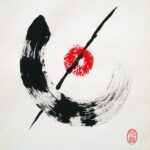
The soul is Spirit´s “cognitive” power and knower of all things.
Where it needs to perceive and know as a demon, it perceives and knows as a demon. Where it needs to perceive and know as a man, it perceives and knows as a man. Where it perceives and knows as a god, it perceives and knows as a god.
Gnostic Notions

An overview of Gnosticism is in order. Etymologically, from Ancient Greek: γνωστικός, romanized: gnōstikós, Koine Greek: [ɣnostiˈkos], ‘having knowledge’ [gnosis]. It’s a composite of mystical and religious ideas which became amalgamated during the latter half of the first century AD, consisting mainly of Jewish and early Christian sects. Their main focus was upon individualized gnosis which sharply contrasted with mainline ecclesiastical institutions. The Gnostics significance is not to be minimized as they were the gate-keepers of the magnificent Library of Alexandria, and as such, they were the guardians of the secret mystery schools of Greece and Egypt. Their main import taught that what was considered to be Supreme Being was in essence a mother-goddess—Sophia—who represented an allegorical function that reflected objective truths that led to the formation of self-realized entities.
Posted in Spirituality, The Soul
Tagged Elaine Pagels, Gnosticism, Gnostics, pneumatic, pneumatikos, psychic, psychikos, Valentinian
Leave a comment
Pauline Revelations

The Apostle Paul was no stranger to Greek notions of the soul. In the first chapter of Romans, he narrates his acknowledgment to the wisdom of the ancient Greeks. Even though he notes that salvation is only available through the gospel of Christ, nonetheless the Greeks had contact with the truth. This truth had been made manifest to them by God. “For the invisible things of him from the creation of the world are clearly seen, being understood by the things that are made, even his eternal power and Godhead, so that they are without excuse . . .” (Rom. 1:20). Also, St. Paul spoke to the men of Athens about their temple that he witnessed being dedicated to an unknown God. Paul then said this “unknown God” is the true God who created the world.
Posted in The Soul
Tagged Apostle Paul, Corinthians, pneumatikos, Psyche, psychikos, Romans, soma
Leave a comment
